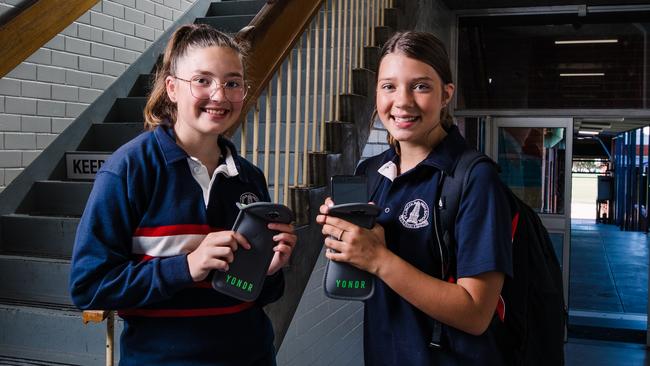Education Minister says phones egg on violence in schools as ban imminent
The Education Minister is standing by a ban on phones in public schools, claiming the technology can be the root cause of student violence.
Education
Don't miss out on the headlines from Education. Followed categories will be added to My News.
The Education Minister has defended the move to ban phones from public schools, saying the devices are the “root cause” of some recent violence in SA institutions.
Education Minister Blair Boyer told ABC Radio Adelaide he believed phones instigated violence and bullying.
“The more conversations I’ve had, the more schools I’ve visited and principals and even parents I’ve spoken to, the more I’m convinced that in a lot of cases phones are actually the root cause of some of the violence we’re seeing,” he said.

“Often the bystanders who are standing around egging on the assailant for lack of a better word are really doing so because they want that footage to share on social media.
“Some people are being good citizens, but I’m afraid in the vast majority of cases, people want to put it up on Tik Tok or something like that. And if we didn’t have those phones there, a lot of the violence and bullying may not happen.”
Principals and teachers have thrown their weight behind the decision despite previously expressing opposition.
Secondary school principals have written to parents detailing how the ban will be implemented from the start of the first term next year.
The move follows extensive consultation over the past two months between the Education Department, principals, teachers, school councils, unions, parent groups and students.

Individual schools will be responsible for enforcing the ban, with students being told they must either leave their devices at home or lock them in storage during school hours.
Other measures will include the use of lockable lead-lined pouches for those requiring access during lessons.
Exemptions will be granted for medical reasons or if students require contact with their parents or caregivers, with cards to be issued to eligible students.
Education Minister Blair Boyer said schools would have a transition period to introduce the restrictions, which would apply to all year levels.
Mr Boyer said the new policy would require students to keep their phones powered off and put into secure storage while at school.
“Individual schools will continue to locally determine the most appropriate storage method for their site,” he said.
“Access to personal devices during school hours must be managed so that students can be fully present in their learning and in their interactions with their teachers and peers.”
Mr Boyer said research had shown banning mobile phones had improved academic outcomes for lower-achieving students.
However, some studies also found students continued to use their devices despite bans and needed to be taught “digital literacy” to regulate their behaviour.
Moves to introduce the ban – promised by Labor before the last state election — intensified in the wake of widely-publicised incidents involving students using phones to video fights at the new Whyalla Secondary College and expanded Golden Grove High School.

In a letter to parents last Friday, Marryatville High School principal John Tiver said he wanted their feedback before December 2 on a draft policy which would see their children lock their phones in storage during school hours.
“Under the incoming policy, all students must keep their mobile phones and other personal devices off and away at school, unless granted an exemption by their school under the department’s policy,” he said.
“This also applies on school activities such as camps and excursions.”
Mr Tiver said the new mobile phone policy would “help promote environments with reduced negative impacts of inappropriate use of devices at school, such as cyber-bullying, exposure to harmful content and critical incidents that involve mobile phones”.
“(It will also create) classroom environments where teachers can teach and students can learn free from distractions caused by personal use of devices,” he said.
“Breaks can be used as quality time away from screens, encouraging physical activity and play and meaningful face-to-face connections with peers.”

South Australian Secondary Principals’ Association (SASPA) chief executive Jayne Heath said mobile phone use was “not only a schools issue, but a wider community issue”.
“I think it’s an issue that some schools – not all schools – are struggling to manage,” she said.
Ms Heath said there had been “some really good consultation” to reflect issues raised by principals and school communities.
“The policy has been well received by principals, particularly that they will have autonomy over any exemptions,” she said.
“Part of the implementation of the policy will need to determine how each school stores the mobile phones and what works for their communities.
“That’s why the transition time will be important as schools roll out the policy from next year.”
Ms Heath said the new policy was “more than a ban on mobile phones in schools”.
“It’s about teaching our young people to use technology in a safe, ethical and responsible way,” she said.
“This is becoming more a life skill.”
“The world has changed a lot in the past few years, particularly with the rise of social media, so we need to ensure schools are addressing the correct context of a very complex issue.
“It needs to be a multi-pronged approach though – it’s something where families, community members and sporting clubs all have a role to play.”
How banning phones changed a school
Port Lincoln High School introduced the use of magnetic lockable pouches for mobile phones last year.
Principal Todd George said he had consulted with teachers about how the devices were increasingly being used by students “as weapons against each other”.
“We had a really disruptive year in 2020, with behaviour issues and lots of harassment online with photos being taken and shared,” he said.
“I ran some student free days with staff to look at ways that we might be able to address the issues we faced and put in a proactive plan.”
Mr George said the roll out of the ban on phones being used during school hours “was very structured and stepped out”.
“The advice was that we went with the whole school all having the same rules so it was an all-in all at once,” he said.
“There was a lot of anxiety from students about using devices for education purposes but the transition was a lot smoother than even I had anticipated.”

Mr George said out of 760 students at the school, he only received three parent complaints.
“Overall, parents applauded it and even asked where they could get similar pouches for home use,” he said.
Mr George said the impact on his school quickly became apparent.
“What I noticed immediately was the amount of activity on the school oval,” he said.
“Girls were sitting in a circle talking to each other, boys were playing cricket and footy.
“They were talking to each other and weren’t embedded on their screens.”
Mr George said before the mobile phone clamp down, the school was having to call police “at least a couple of times a week due to issues with students as a lot of it was cyber driven”.
“We now very rarely see SAPOL here,” he said.
Mr George said his staff also had reported feeling more connected to students in the classroom.
“Mobile phones aren’t an issue here anymore – and it changed very quickly,” he said.
Colin James



